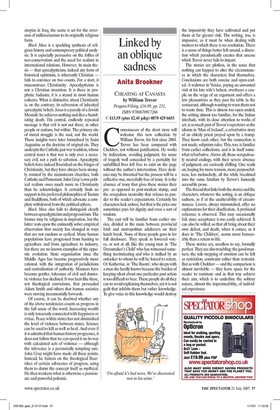Linked by an oblique sadness
Anita Brookner CHEATING AT CANASTA by William Trevor Penguin/Viking, £16.99, pp. 231, ISBN 9780670917266 £13.59 (plus £2.45 p&p) 0870 429 6655 Connoisseurs of the short story will welcome this new collection by William Trevor, his first since 2004. Trevor has been compared with Chekhov, not without justification. He works by indirection, avoiding judgment, his sense of tragedy well concealed by a partiality for unfulfilled lives left free to exist on the page without the author's intervention. Here destinies may be thwarted but the process will be a reflective one, mercifully free of irony. It is the absence of irony that gives these stories their preas opposed to post-modern stamp, and the scrupulous neutrality that refuses to pander to the reader's expectations. Certainly his characters lack ardour, but that is the price one sometimes pays for dignity and even a sort of wisdom.
The cast will be familiar from earlier stories, divided in the main between provincial Irish and metropolitan adulterers on their lunch break. None of these people goes in for full disclosure. They speak in lowered voices, or not at all, like the young man in The Dressmaker's Child' who has witnessed something incriminating and who is stalked by an onlooker to whom he will be forced to return. Or Katherine, in The Room', who sleeps with a man she hardly knows because the burden of keeping silent about one particular past action is too difficult to bear. These people do all they can to avoid explaining themselves, yet it is not guilt that inhibits them but rather knowledge. To give voice to this knowledge would destroy the impassivity they have cultivated and put them at far greater risk. The writing, too, is impassive, as it must be when dealing with matters to which there is no resolution. There is a sense of things better left unsaid, a discretion which paradoxically creates that unease which Trevor never fails to impart.
The stories are plotless, in the sense that nothing can happen to alter the circumstances in which the characters find themselves. Conclusions are both concise and open-ended. A widower in Venice, paying an unwanted visit at his late wife's behest, overhears a couple on the verge of an argument and offers a few pleasantries as they pass his table in the restaurant, although wanting to warn them not to waste time. This is almost too open-ended, the setting almost too familiar, for the Italian interlude, with its close attention to works of art, is as much part of Trevor's repertoire as the idioms in 'Men of Ireland', a rebarbative story of an elderly priest preyed upon by a tramp. They know each other, but the connection is not made; solipsism rules. This, too, is familiar from earlier collections, and is in itself somewhat rebarbative. Above all, those scrupulously neutral endings, with their severe absence of judgment, are curiously chilling. One reads on, hoping for more tension, more purposefulness, less melancholy, all the while becalmed into the same fatalism by Trevor's famously accessible prose.
The thread that links both the stories and the characters, whatever the setting, is an oblique sadness, as if at the unalterability of circumstances. Lovers, always mismatched, offer no explanations for their disaffection. A profound reticence is observed. This may occasionally fail, since acceptance is too easily achieved. It can also be willed, so that all bring about their own defeat, and death, when it comes, as it does in The Children', seems more honourable than a return to life.
These stories are, needless to say, formally perfect. They are also troubling: the good manners, the side-stepping of emotion can be felt as restriction, constraint rather than restraint. But as with Chekhov — and the comparison is almost inevitable — they leave space for the reader to ruminate and in that way achieve their aim, which is to underline the solitary nature, almost the impermeability, of individual experience.












































 Previous page
Previous page